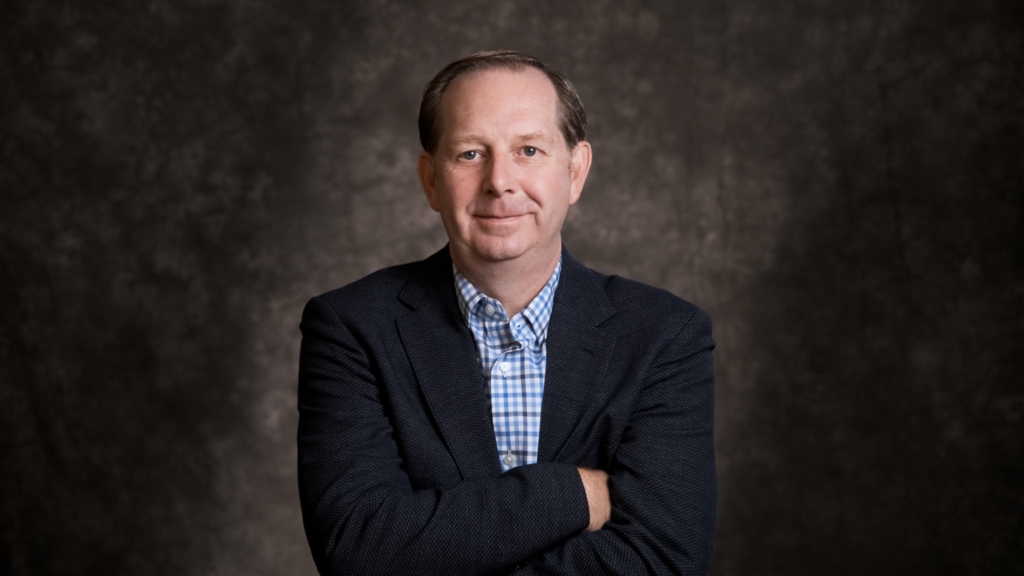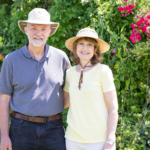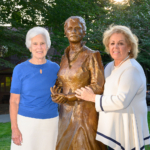An Entrepreneurial Attitude
Brian and Ann Marie Pryor are paying it forward through their campaign support of the entrepreneurship minor by endowing The Pryor Family Fund for Entrepreneurship.
Expanding opportunities for students to explore entrepreneurship – most recently with the launch of a new undergraduate minor – prompted Board of Trustees member and Salve Regina alumnus Brian Pryor ’92 to jump in with both feet, not just with a leadership gift he and his wife Ann Marie (Anzalone) Pryor ’92 pledged to the University’s comprehensive campaign, but as a mentor for the program.
Pryor, who graduated with degrees in chemistry and mathematics, is a serial entrepreneur who, in his professional career, has developed and brought to market numerous lasers and light-based medical devices. His philosophy personifies key traits of the University’s evolving entrepreneurship program that make it uniquely Salve – being open to students across all disciplines and being closely tied to Salve’s mercy mission.
“One of the most interesting things about Brian is that he wasn’t a business major in college,” said Adam Witham, assistant professor of business and economics, one of several across campus who have been instrumental in growing the entrepreneurship program.
“Entrepreneurship isn’t just the study or the field where we talk about starting up a business or coming out with a new product,” he added. “It’s applying a mindset. It’s coming up with a creative solution for tackling a problem. And that can be combined with any field out there.”
A Salve Experience
Salve has been an important and influential force through much of Pryor’s life. “Salve did a lot for Ann Marie and I,” he said. “I grew up very blue collar. My parents did not go to college, and Salve provided quite a bit of aid and scholarships to attend, so that’s a big reason to pay it forward.”
As undergraduate students, he and Ann Marie were involved in many extracurricular activities outside of their majors, a characteristic of the Salve experience that Pryor believes is one of its unique strengths. He played baseball throughout all four years and was captain of the team. Both served as members of the student life senate, and Ann Marie was elected president in her senior year. They also organized Salve’s first Thanksgiving food drive in their senior year – “entrepreneurs with a mercy twist,” as Pryor recalled, and an apt description for a couple who have accomplished a great deal personally and professionally.
An elementary education major with a special education minor, Ann Marie teaches religion to sixth-, seventh- and eighth-grade students at Holy Angels School in Newark, Delaware. Pryor went on to earn his Ph.D. in physical chemistry from the University of Pennsylvania in 1998 and joined Salve’s board in 2022.
He founded LiteCure in 2006, a leader in therapeutic laser technology for human and animal health care. He sold the company in 2020 and is currently focused on growing several new companies developing medical products, including devices for women’s pelvic pain management (Sola Pelvic Therapy); for treating the brain for depression, Alzheimer’s and Parkinson’s (Neurothera); for athletic training – including a device currently being used by Salve athletes (mTrigger); and for lessening the side effects of cancer treatments, among others (SBR Bio).
He attributes Salve’s well-rounded culture and education for providing him with the tools to succeed in his professional career. This became evident when Pryor was working at a small company specializing in the custom development of scientific instruments. He realized he had a skill set for translating complex ideas that the everyday person could understand. With that realization, he also understood that he could advance his career in a new direction – toward entrepreneurship.
“I was doing the scientific development when I realized I could do the sales, business development as well or better,” Pryor said. “I pride myself on being able to talk to anyone and stress this to all young people. Every person is a salesperson. You may not get paid that way, but you have to sell yourself to get a job … you have to sell yourself and your ideas throughout your life.”
Pryor believes one of the most important benefits to establishing entrepreneurship opportunities at Salve is the University’s ability to provide exposure to the program without barriers. It can be an opportunity for all majors. The key, he says, is to get students engaged in entrepreneurial thinking, especially when they approach it from a variety of interests and passions. The new entrepreneurship minor allows for exactly that.
“It’s a little bit different way of thinking that can help everybody – no matter if they’re going to be a teacher or a nurse or a scientist,” he said. “To have that entrepreneurial attitude of thinking a little bit outside the box is so important. Every career has different paths. There is a lot of growing that you do in your career, and I think entrepreneurship helps you get out of your comfort zone.”
It’s also an especially important way to advance Salve’s mission. “What better way to teach or prepare the next generation of social entrepreneurs than to really learn about the entrepreneurial way of thinking,” Pryor said. “It really is a perfect match to inspire the next generation.”
Entrepreneurship at Salve
Launched during the 2022-2023 academic year, Salve’s entrepreneurship minor is quickly gaining popularity among undergraduate students from a variety of study areas. Even students who have not yet declared a major – the exploratories – are looking at the minor so they can combine it with whatever their main area of study will be one day.
“We are seeing its appeal across campus to a general type of student that likes creative thinking and problem solving,” Witham said. “If a student wants to think about public speaking alongside entrepreneurship, that could be one of their elective classes they could take. They could take a class on organizational behavior or psychology, there’s all different approaches we can take that allows a student to basically build it and develop it relative to their interests.”
The minor consists of four required courses – Entrepreneurship, Entrepreneurship Marketing, Entrepreneurship Finance and Accounting, and New Venture Development – and two electives from disciplines such as accounting, art, biology, communications, data science, economics, management, political science, psychology and social work. New Venture Development is the culminating experience where students can launch their own idea or think about what it would take to truly bring an idea to market.
“We looked for courses from across the entire campus that reflected skills necessary for entrepreneurship or things that can be valuable for an entrepreneur,” Witham said. “If a student’s interests are in psychology, chemistry or environmental science, that’s great. And by using an entrepreneurial mindset, that allows students to tackle problems in the world.”
Salve’s entrepreneurship initiatives started picking up steam during 2021-2022, when faculty and staff in the Department of Business and Economics attended a symposium to discuss goals for the year, and the department became a member of the Global Consortium of Entrepreneurship Centers.
In spring 2022, Witham helped kick off a robust and ongoing Entrepreneurship Speaker Series on campus and the first Seahawk Tank Pitch Competition was held in partnership with Innovate Newport, during which students showcased their new business ideas before community members. Salve established a formal partnership with Innovate Newport that gives students an opportunity to network with entrepreneurs in the region, contribute to entrepreneurial endeavors in Rhode Island, and host events.
In addition to Seahawk Tank, Salve students organized and hosted the Rhode Island Summit for Entrepreneurship at Innovate Newport, providing access to workshops, flash talks, a keynote speaker and networking opportunities that included participation from the University of Rhode Island and Roger Williams University.
Witham believes that partnering with local community organizations and nonprofits is an important way for students to approach creative problem solving for social issues. “For instance, our [Mercy] Critical Concern that Salve is focusing on this year is around women and gender, and with that we started talking to the Women’s Resource Center of Newport. We started talking to the Fall River (Mass.) Deaconess Home,” he said. “We challenge students to think about the real issues facing women today around the community and around Rhode Island. And they try to think about how we could form solutions to tackle these problems.
“When we’re constantly thinking about not only our classes, but the clubs, the opportunities that students can have in entrepreneurship and tie it back to the mercy mission, that’s how we’ll be unique because it’s not profit driven,” Witham added. “This is not a system where it’s entirely driven by self. It’s really thinking about others and thinking about something greater for the community and greater for the world. So that’s our approach. I’d say it’s pretty unique.”
Looking forward, Salve continues to branch out. Faculty are among those participating in the newly formed UNIE-RI, a network that includes entrepreneurship leaders from every college and university in the state who meet regularly to learn from each other. The goal is to strengthen higher education’s contributions to the state’s entrepreneurial vitality.
“When we’re thinking about how we can constantly make a world that’s more just and merciful, entrepreneurs are the ones who do that every day,” Witham said. “They’re coming up with the ideas and are taking risks. They’re trying to study what sort of products, what sort of services, what sort of ideas would make the world a better place and they’re going and trying to put them into action.”




